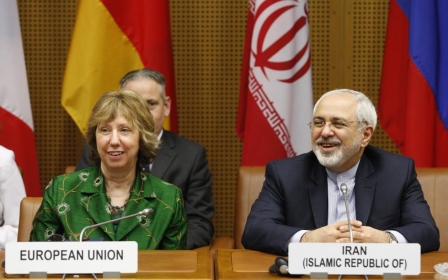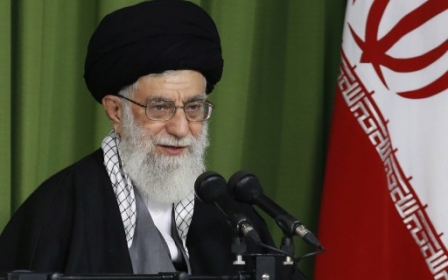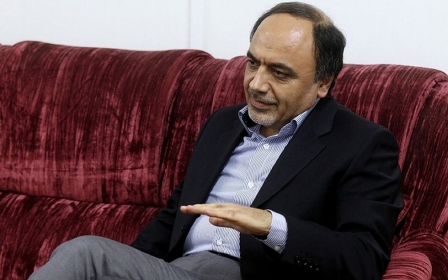Iran's supreme leader reveals demands in nuclear talks

Iran's supreme leader revealed on Tuesday his country's demands for a significant long-term increase in its nuclear enrichment capability, laying bare huge gaps between Tehran and world powers negotiating a deal.
The comments, published on Ayatollah Ali Khamenei's website, represent a dramatic intervention in the talks currently taking place in Vienna between Iran and the P5+1 group of Britain, China, France, Russia and the United States, plus Germany, for a nuclear accord.
His remarks relate to the enrichment process of producing fuel from centrifuges for nuclear power stations, which the West and Israel says, in highly extended form, could be used to develop an atomic bomb.
Iran currently has around 19,000 centrifuges -- of which only 10,000 are working -- but says more powerful machines will be needed to develop enough nuclear energy in the future.
Khamenei said the required enrichment capability would be 19 times higher than the West currently wants to allow under a comprehensive agreement.
Uranium enrichment and centrifuge numbers are the most sensitive topic in the negotiations, which aim to conclude a deal by 20 July.
But with less than two weeks until that deadline, the supreme leader's remarks exposed a gulf that still exists between Iran and the P5+1, who are seeking to curb Iran's nuclear activities.
Referring to the machine used in uranium enrichment, Khamenei, who has the final word on all matters of state, said: "Their aim is that we accept a capacity of 10,000 separative work units (SWU), which is equivalent to 10,000 centrifuges of the older type that we already have.”
"Our officials say we need 190,000 [SWU]. Perhaps not today, but in two to five years that is the country's absolute need," he added
Curbs for sanctions relief
Ali Akbar Salehi, the head of Iran's Atomic Energy Organisation, later said the Islamic republic's enrichment demands should be defined in terms of SWU, not the number of centrifuges, given that new machines being developed are more powerful than existing ones.
"To ensure the necessary fuel to the Bushehr plant, the Tehran research reactor and the Arak reactor, we need 190,000 SWU," he said, according to official IRNA news agency.
"We are working on centrifuges with a capacity of 24 SWU. It means that we will need less than 10,000 centrifuges to produce fuel in a year at Bushehr," he added.
Any nuclear deal would involve a framework and years of monitoring, but Khamenei's open declarations throw into doubt the room for compromise and an eventual deal with the West.
According to American media reports, the United States may accept Iran having between 2,000 and 4,000 low powered, first generation centrifuges.
French Foreign Minister Laurent Fabius said last month that Iran could retain "several hundred centrifuges" but he disclosed that the Iranians were asking for "hundreds of thousands."
The accord being sought by the P5+1 aims to finally end talk of possible US or Israeli military action against Iran. The Islamic republic has always denied seeking an atomic bomb.
In exchange for an agreement, Iran wants punishing Western sanctions to be lifted.
Deputy Foreign Minister Abbas Araqchi, a top member of Iran's negotiating team, welcomed the supreme leader's comments and tweeted that he and his colleagues "would not give up any of our nuclear rights."
With Sunni insurgents overrunning large parts of Iraq, and Syria in chaos from civil war, a nuclear deal could help Tehran and the West normalise ties at a particularly explosive time in the Middle East.
In a video message last week, Iranian Foreign Minister Mohammad Javad Zarif described the talks as a "unique opportunity to make history", saying success would allow both sides to address "common challenges" such as Iraq.
Talks may be extended
The talks have been aiming to secure an agreement by 20 July, when an interim deal struck in November expires.
The six powers want Iran to drastically reduce its nuclear activities to render any drive for a weapons capability all but impossible.
The 20 July deadline could potentially be extended by up to six months, and many analysts believe this is already being negotiated.
But US President Barack Obama, facing midterm elections in November, is wary of doing anything that could be construed by his Republican opponents as giving Iran more time to get closer to having the bomb.
This is the longstanding accusation of Israel, the Middle East's sole if undeclared nuclear-armed state.
Middle East Eye propose une couverture et une analyse indépendantes et incomparables du Moyen-Orient, de l’Afrique du Nord et d’autres régions du monde. Pour en savoir plus sur la reprise de ce contenu et les frais qui s’appliquent, veuillez remplir ce formulaire [en anglais]. Pour en savoir plus sur MEE, cliquez ici [en anglais].




